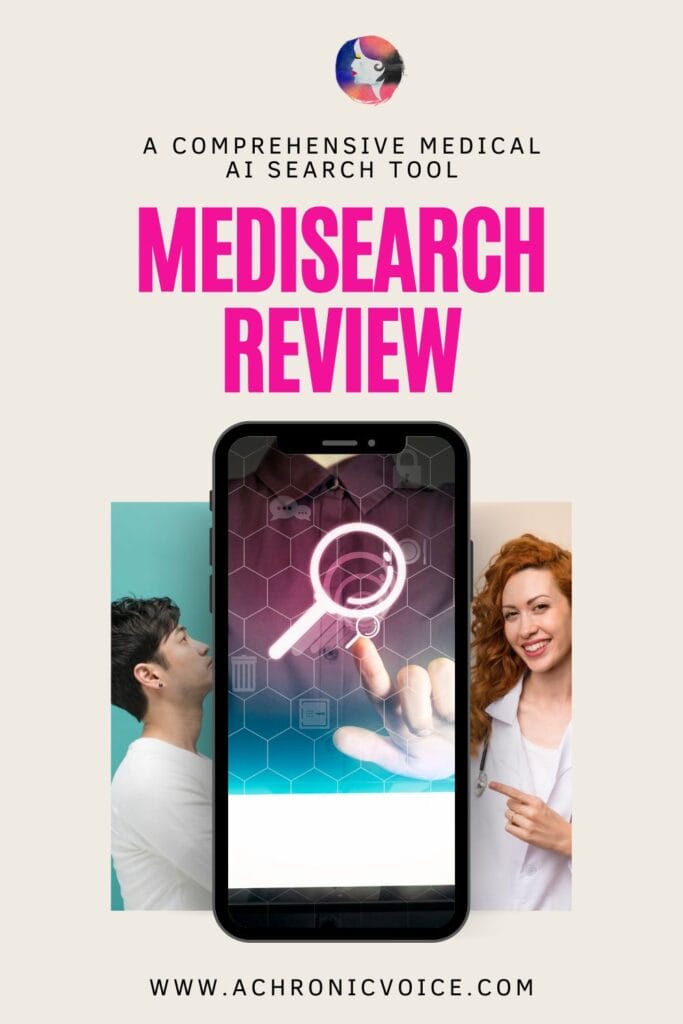Introduction to MediSearch, a Medical AI Search Engine
You’ve probably asked ChatGPT, Gemini or another AI-powered chatbot a medical or health-related question before. Perhaps to try and find a diagnosis, or simply out of curiosity. I have personally asked them some medical questions that I already knew the answers to, simply to see how accurate they were. Google Gemini tends to skirt around health-related issues, whilst ChatGPT gives rather generic answers.
That is not necessarily a bad thing, because the scope of what these AI chatbots cover are quite broad. MediSearch on the other hand, is specifically built to focus on answering medical questions. Thus, you could say that it concentrates all of its resources on health-related topics, to give more detailed and accurate responses.
So when the founder of MediSearch, Eduard, approached me to write an honest review, I was excited to say the least. He also granted me access to the Pro version of MediSearch, so I could test the system and see the differences for myself. Let’s dive into the review – the good and bad (if any)!
*Disclaimer: Whilst this post is sponsored by MediSearch, all opinions expressed in this review are my own. This article is meant for educational purposes and is based on the author’s personal experiences. It is not to be substituted for medical advice. Please consult your own doctor before changing or adding any new treatment protocols. This post may also contain affiliate links. It will cost you nothing to click on them. I will get a small referral fee from purchases you make, which helps with the maintenance of this blog. Read our Privacy Policy page for more information. Thank you!
Pin to Your Medical AI & Health App Boards:
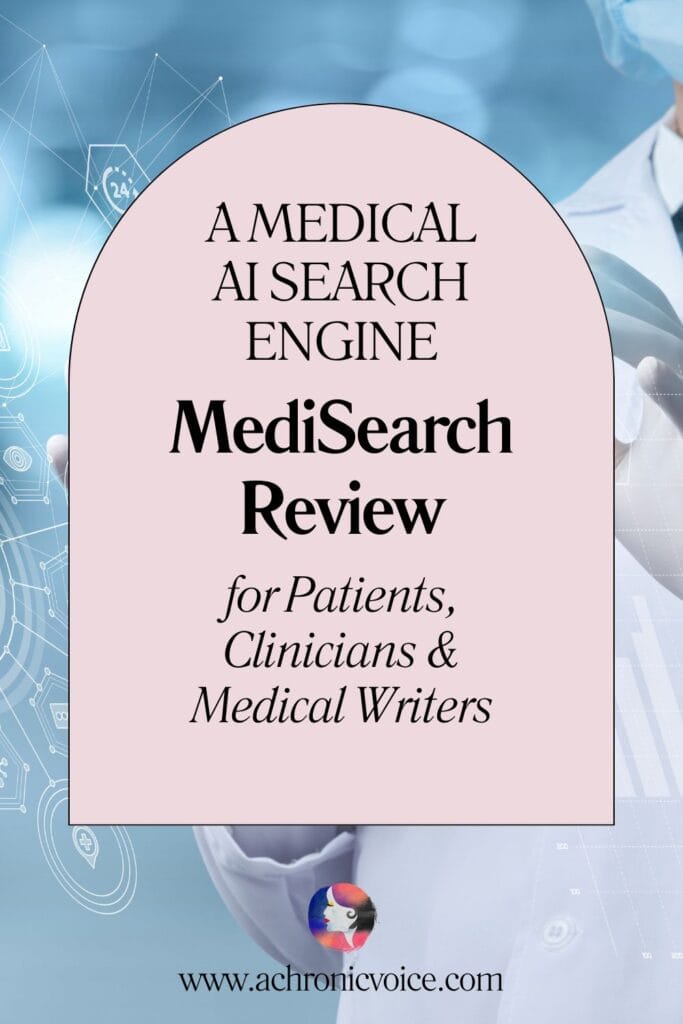
What is MediSearch Exactly, and is It Credible?
MediSearch is a medical AI-powered search engine with over a million users to date. It aims to be the world’s best medical Q&A system. It filters out the noise and only references credible sources and journals – so no random or woo-woo websites. ChatGPT and other AI chatbots are infamous for hallucinating, or to be more harsh, Scientific American straight up says they’re “bullshitting”.
MediSearch on the other hand, cites and links to all sources it derived its answers from. You can click on neatly arranged links to read the medical articles for yourself. If there are no credible sources to be found for your medical question, it will tell you so, or suggest potential questions you might be interested in instead.
One other thing that I love about MediSearch is that it is always up-to-date, so the answers it gives are all based on the latest scientific evidence. Its database is updated within hours of new publications. Even my favourite medical apps, such as MedScape (which I use to check for drug interactions), take weeks to prompt a manual update of medical information. To me, MediSearch truly taps into the power of AI to serve its purpose.
How MediSearch Works
If you’ve ever used ChatGPT or similar, then you know the drill. Simply ask MediSearch a medical question, and it quickly generates the answer with all sources cited. It differs from ChatGPT in the sense that you can’t simply type ‘tell me more’ like in a conversation, but it will suggest possible questions you can follow-up on.
I actually like that it does that, because it doesn’t guess what you’re trying to ask, which can lead you down rabbit holes. For example, I use ChatGPT quite a bit for coding work, but have realised that asking it questions in a conversational style often leads to errors. This is because it infers from the previous text, and amplifies its ‘understanding’ – which can often be false. Specificity is extremely important for medical questions, as it concerns you and your health.
Something else I like about MediSearch is the way its algorithm works. You don’t only get a summary of answers to your medical questions, but one that has been carefully crafted based on ranking factors such as journal quality, number of citations, and more. This means that the answers you’re getting are quality ones.
How Well Does MediSearch Perform for Medical Questions?
According to their website, MediSearch Pro has a 94% accuracy score when tested on the United States Medical Licensing Examination (USMLE) sample examination. The average score for a medical school graduate student taking the exam is 60%. Like me, you might be wondering what the USMLE is exactly, and I took the opportunity to ask MediSearch:
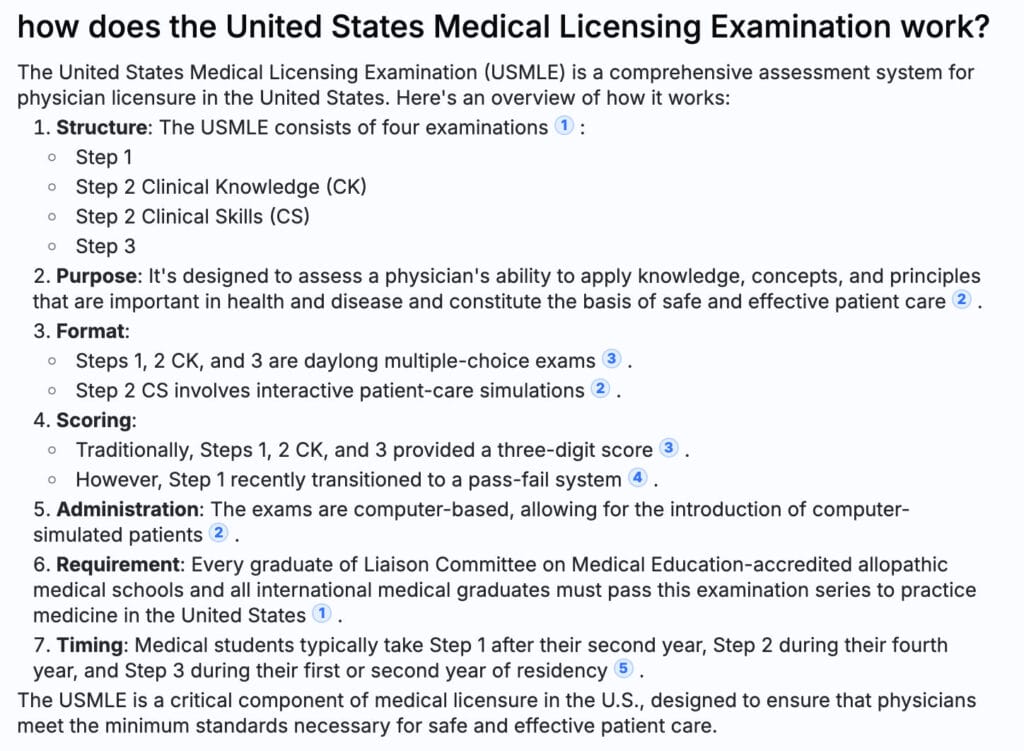
As you can see, the answer that MediSearch generated is comprehensive, and the information is broken down into a readable format that is easy to digest. The USMLE is an important exam that is compulsory for medical students to take, in order to practice medicine in the U.S.
When compared to other AI-powered search engines, MediSearch also had the highest accuracy score for the USMLE sample test, as can be seen from the chart below:
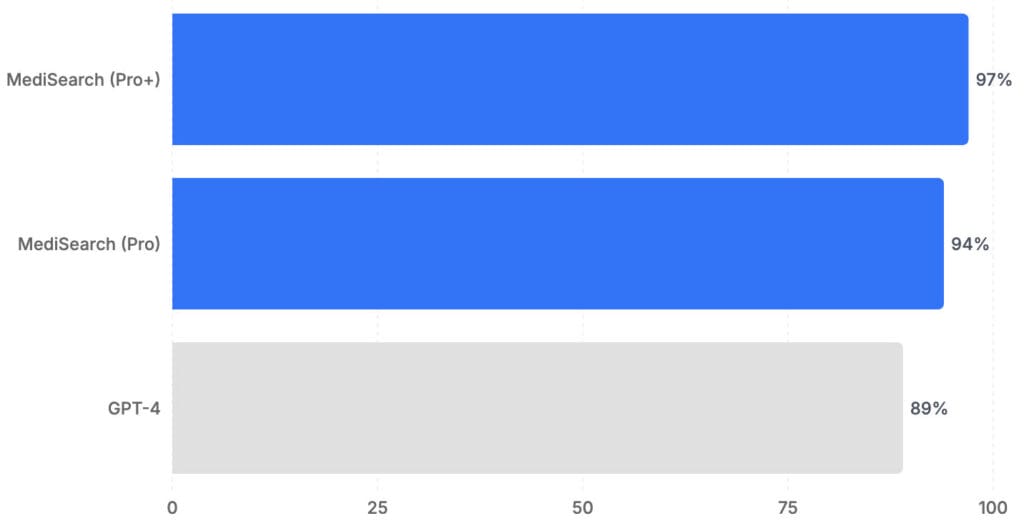
Taking MediSearch for a Test Drive
I decided to ask MediSearch questions I have done extensive research on as a patient, namely Antiphospholipid Syndrome (APS) and Spontaneous Bilateral Patellar Tendon Rupture (SBPTR). These are medical conditions I live with, and have written resources on myself.
Asking MediSearch a Basic Medical Question
I started with a basic question about APS, “What are the lab tests used for diagnosing Antiphospholipid syndrome?”:
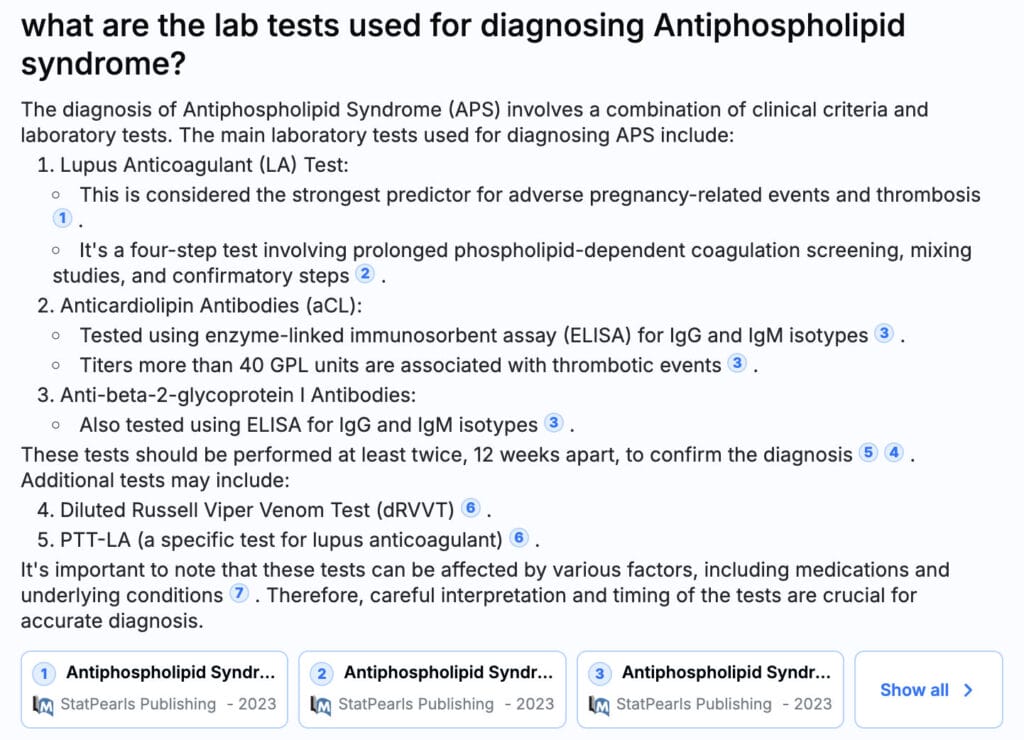
This pretty much summarises what took me hours of manual research, in order to include proper references for my APS resource guide. It also highlights that LA is “considered the strongest predictor for adverse pregnancy-related events and thrombosis”. This is an important note, and something my own rheumatologist has pointed out to me before.
Asking MediSearch a More Complex Medical Question
Next, I decided to ask MediSearch about Tecarfarin, which is a blood thinning medication still undergoing clinical trials. It is a drug that is targeted more for heart and kidney disease patients, and less for APS (a blood clotting autoimmune disorder), so I was curious as to what its response would be.
The response provided by MediSearch was well-informed once again, as seen in the screenshot below. It states clearly that Tecarfarin is still limited in evidence for APS, and tells me more about what it is, which stage the clinical trials are at, and more important medical information. This matches up with the research I had done (as a patient) for my article on medications in relation to APS, which took me months to put together.
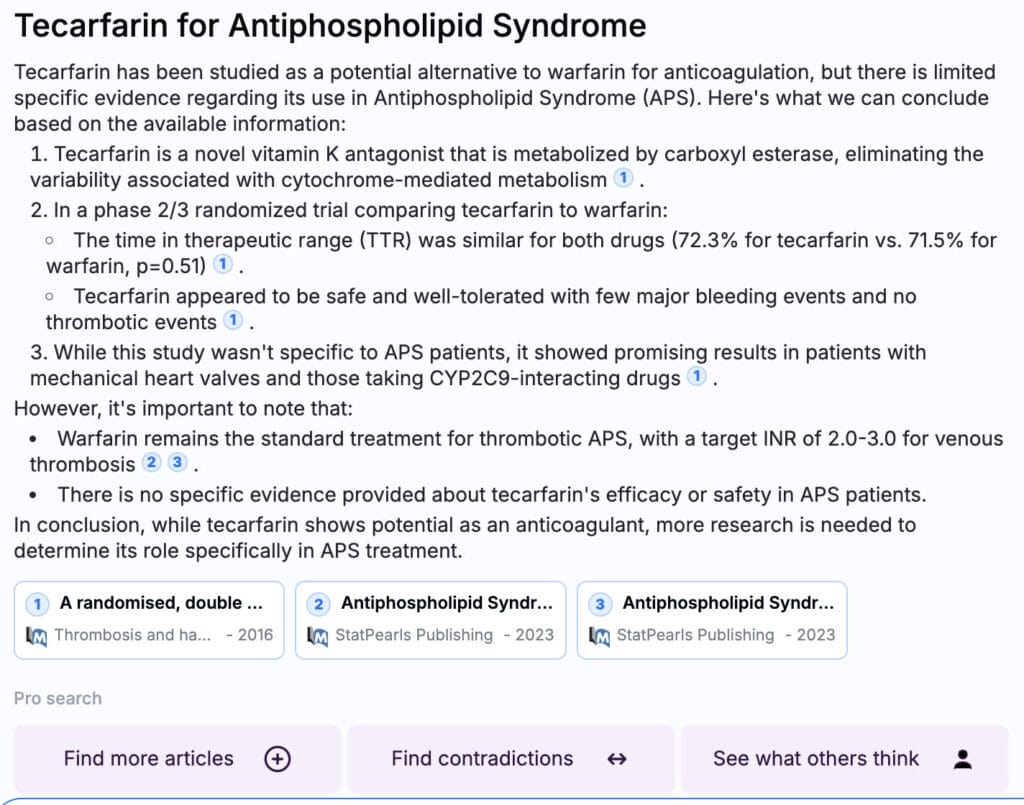
Who is MediSearch for?
MediSearch isn’t only for medical writers, clinicians, or chronic illness patients who have lived with their diagnoses for years. It is also suitable for ‘everyday’ health questions that the average person may have, such as, “is coffee good for health?”, “best foods for reducing cholesterol”, or even “is breakdancing considered a sport?”. Yes sorry, I just had to ask MediSearch about breakdancing, given the Olympics fiasco 😉
Even for ‘simple’ questions such as these, MediSearch cites its sources. I tried asking ChatGPT 4.0 the same question about coffee, and whilst it provided the potentials and drawbacks, no sources were cited. We are living in an age of information overload, disinformation and misinformation, so it’s even more vital to know where the answers generated come from – which MediSearch does.
Every single source it cites is clickable, and taken from actual medical journals, international health guidelines, published books and other credible sources. Regular AI chatbots on the other hand, are fairly limited when it comes to medical questions, as they are only able to retrieve information from open-access or free/public resources.
P.s. To see what the answer is to: “is breakdancing considered a sport?”, simply type the question into the search box on MediSearch’s website. 🙂
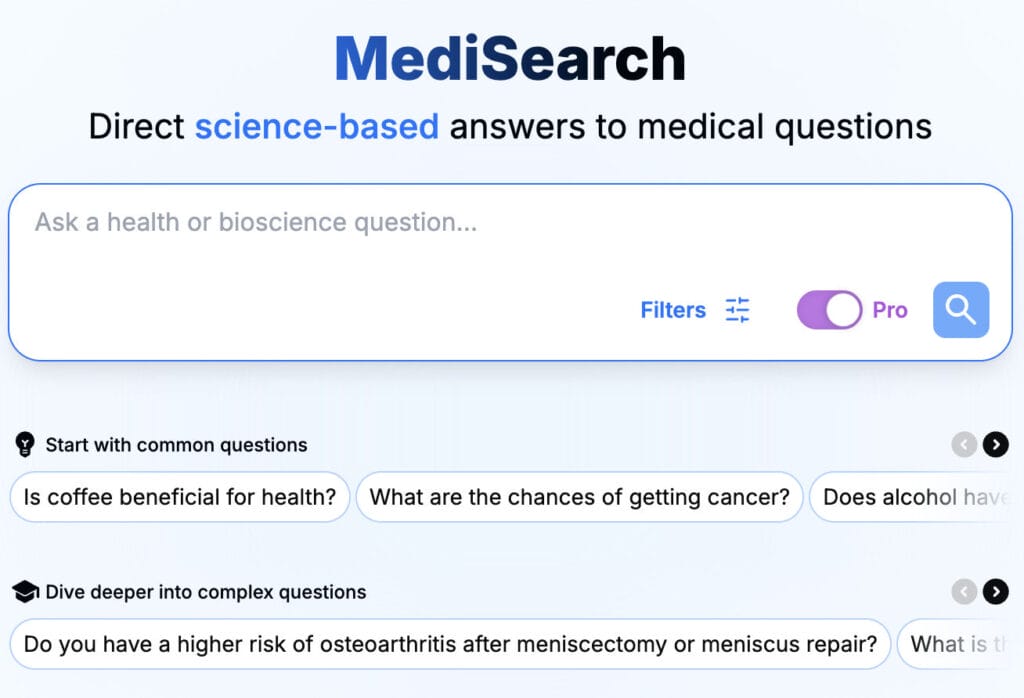
Benefits of MediSearch Pro Version
Increased Number of Sources to Refine Accuracy Further
The answers you have seen in this review thus far are all from the MediSearch Pro version. Whilst the standard version gives concise answers as well, the MediSearch Pro version sources from more medical articles, which further refines accuracy.
A sample from the standard version can be seen from the screenshot below. If you compare this to the other screenshots we have seen thus far, whilst it is still evidence-based and informative, the answers from the Pro version are more detailed and streamlined. For the example question below, “is coffee beneficial for health?” – the standard version cites two references, whereas the Pro version gave me 10.
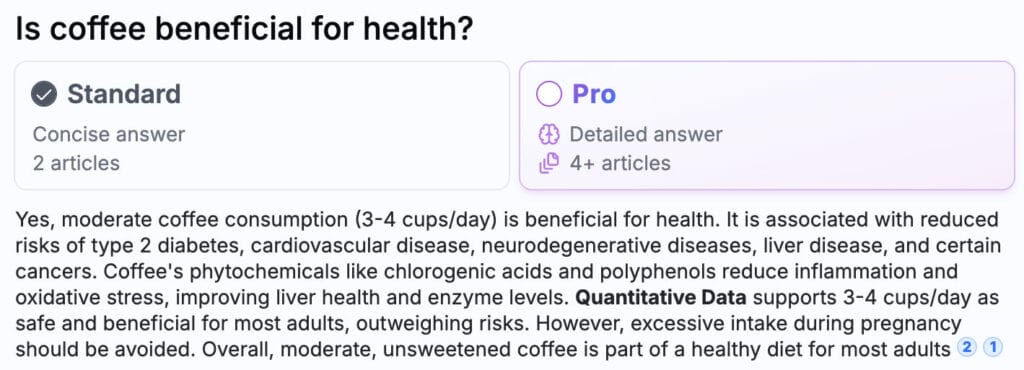
Advanced Filter Options and Citation Tools
If you use Google Scholar, then I’m sure that you’ve clicked on ‘filter by publication date’ at some point, because you want the latest information about a specific topic. MediSearch Pro has a filter by date feature as well, and you can also select which type of sources you want it to search from, such as “scientific articles” and “books”.
If you are a medical writer or need to compile a list of references, MediSearch Pro’s citation tool comes in handy. I personally gather all my references using Zotero, and the ‘export’ feature in MediSearch Pro is compatible with it, including its browser extension. This will save me so much time for research-based articles I write in future.

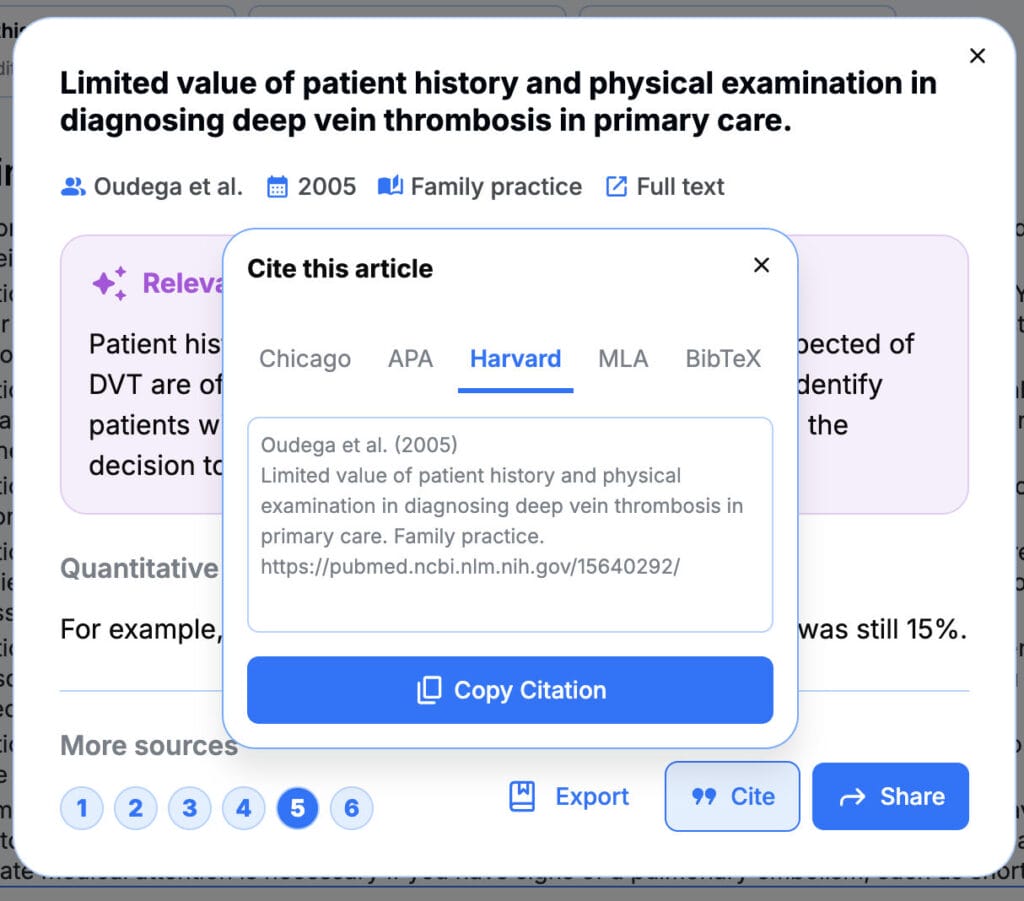
Search for Related Insights with a Click of a Button
In addition, the Pro version also allows you to search for more related articles, find contradictions and see what others think. These additional insights are important if you’re doing research – whether for personal or work related purposes.
If you’ve done research for anything at all (shiny objects included), then you know how important perspectives can be. It is good to have all the cards laid out on the table, so that you can make better judgement calls. The “find contradictions” feature to me is a very good one, because it questions the initial answers to see if there may be potential loopholes.
The “see what others think” feature is also quite interesting, although I personally wouldn’t use it much. It essentially peeks into Reddit threads to see what others have been asking or thinking about in relation to your topic.
This may be a personal preference thing however, as I don’t even trust Reddit on a regular day (I may be a millennial…). I do know that many of my Gen Z friends use Reddit more than even Google Search however, so I can see how this is useful. In their own words, “it gives me human, straightforward answers, and not some lengthy blog with a biased opinion”.
Another thing you could potentially do is to see what others are asking or thinking, rephrase it into a specific question, then feed it back into MediSearch to find out what the science actually says.
Other Video Reviews Available on MediSearch Pro by Health Professionals
If you hate to read and prefer to watch a video to see how best to utilise MediSearch Pro, here are some great reviews by medical professionals and/or establishments:
How to Use MediSearch for Your Medical Writing (by Alex Evans, PharmD, MBA):
Dr. Vimalakar Reddy of KIMS-SUNSHINE Hospitals reviews Medisearch AI tool:
More for the Technically-Inclined and Businesses
MediSearch comes with documentation for developers. You will need an API key to integrate MediSearch into your website or app, which can then be used to generate a medical Q&A chatbot.
Medical businesses or establishments can also use MediSearch to benefit both clinicians and patients. For patients, MediSearch Pro can be used to generate evidence-based health tips, based on individual user data. For clinicians, MediSearch can be used to manipulate Electronic Health Records (EHR) for summaries and also in other novel ways.
Conclusion to My MediSearch Review: Would I Get the Pro Version as a Chronic Illness Blogger and Patient?
The answer is a resounding “yes”. I honestly loved how streamlined, concise and accurate the answers were, and the intuitive user interface. If you have been following my blog for a while, you would know that I recently published an APS A – Z resource guide. This resource took me years to complete, and is truly a work-in-progress. There is still a lot of information that I would like to add to it, such as a related article about herbs, foods and drinks to avoid with APS. With MediSearch Pro, I know that the research process will go much quicker this time around, and I’m actually excited to get started again.
I also work as a medical writer for my own clients, on topics such as digital healthcare, orofacial pain, oral medicine, vitamins and more. I spend a lot of time doing manual research for each article, which can take me days or weeks – more than the actual writing itself. I can see how MediSearch Pro will be an asset to my medical writing jobs in future as well.
In addition to the website version, you can also download MediSearch on the Apple or Google app store – just click on the buttons below:
Visit the MediSearch Website
Download MediSearch on the Apple Store
Download MediSearch on the Google Store
If you liked this article, sign up for our mailing list here so you don’t miss out on our latest posts! You will also receive an e-book full of uplifting messages, quotes and illustrations, as a token of appreciation!
Pin to Your Medical Technology & Health App Boards:
